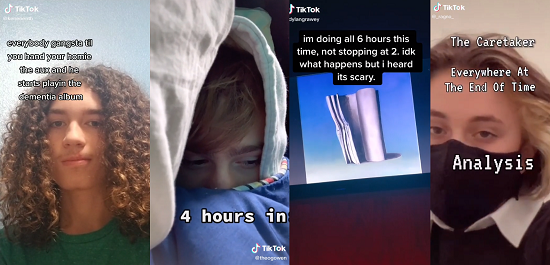Everywhere At The End Of Time, The Caretaker’s crushing six-and-a-half-hour album exploring dementia, has become an unlikely viral hit on Gen Z video-sharing platform TikTok.
Users of the social media site have been challenging each other to listen to the entire record, and documenting their response to the experience having done so.
The album was initially released in six installments between 2016 and 2019, with each part further disintegrating in sound to mirror the loss of memory and identity that comes with the progression of the disease. Last year, we ranked the completed project at number one in our list of the best compilations, reissues and mixes of 2019.
In an in-depth interview with tQ’s John Doran at the start of the project in 2016, the producer, AKA Leyland James Kirby, explained that he was ending his ‘The Caretaker’ moniker with the album, which would incorporate samples from his previous records.
"My final idea has been to give the whole project dementia," Kirby explained. "Originally I was going to make one recording and take it down into the abyss over a period of three years. So the idea would have been to do one recording and degrade it, to process it down so you would get a continuation from the start to the end point. But then I thought, ‘Wouldn’t it be better to give the whole project dementia?’ That then forces me to think, ‘Well, what do I remember from the project myself?’ Because it’s nearly 20 years since I started making the first record. And then I developed this idea of doing six releases each with a gap of six months between each one to give a sense of time passing."

Now, a year since Kirby completed Everywhere At The End Of Time, #TheCaretaker now has seven million views and counting on TikTok. There has been backlash from some users, however, who believe that the TikTok challenge trivialises its subject matter.
tQ caught up with Kirby for his reaction to the album’s newfound popularity.
How did you first become aware that Everywhere At The End Of Time has become a TikTok challenge? What was your first reaction?
Leyland James Kirby: Viewing figures on YouTube have been increasing exponentially since the beginning of the year. I think the fact it’s found its way onto TikTok is due to an increased visibility and awareness of the work actually existing. The hardest thing for any independent work to attain is its visibility. The fact it’s a challenge on TikTok is endemic of modern social media tropes among younger people for many of whom shared experience is everything.
Has it led to any meaningful increase in streams, downloads or purchases of the album?
LJK: It’s tough to say because I would imagine many younger people that populate TikTok are not conditioned into supporting work directly via an ownership/direct support model. Streams have increased via its own momentum and not only via TikTok. Sales I survive on as nothing stream wise is monetised and the work is not on Spotify or other streaming services.
Some users have said that making the album into a challenge is trivialising the subject matter. What do you make of that?
LJK: I think you will always have people who defend the work and are passionate about how it’s perceived so it’s natural they will be upset with it being seen as a challenge. Dementia is not a trivial subject matter.
From what I see from messages I receive it’s also given younger people an understanding into the symptoms a person with dementia may face. Ultimately if younger people see that music can be an experience and goes deeper beyond what is being manufactured and bombarded at them then independent musicians benefit.


